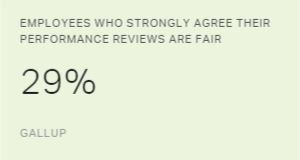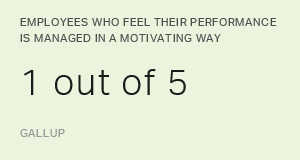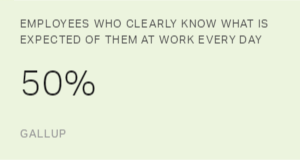Annual performance reviews can be one of the most uncomfortable parts of being an employee -- and being a manager.
For employees, annual performance reviews are like walking into the unknown: sitting down for a long meeting with a manager they may not have talked to in a while, trying to remember what goals they set months ago, defending mistakes they can't fix and figuring out how to bring up pay in a way that isn't awkward.
For managers, it can be just as unsettling: summing up a whole year of work with a single performance rating, holding employees accountable for goals they may not have looked at in months, trying to recall teachable moments throughout the year and figuring out how to discuss -- or avoid discussing -- pay.
And yet, for all the effort organizations put into the review process, the traditional approach doesn't appear to be paying off. A mere 14% of employees strongly agree that the performance reviews they receive inspire them to improve, and only two in 10 employees strongly agree that their performance is managed in a way that motivates them to do outstanding work.
It's with this in mind that many notable organizations, such as Accenture, Netflix, Microsoft, General Electric and Eli Lilly, have decided to throw out their performance review playbooks -- or at least pages of them -- and think about their performance management systems differently.
As performance management evolves, questions abound: Should there be formal evaluations at all, or should they be more informal? Should there be ratings or no ratings? Do reviews need to be simpler, or are they too vague? Do we need more data or more subjective input?
These debates are often distracting. The essential question is this: "How do we hold people accountable for their performance in a way that is more accurate, helpful and inspiring?"
Reimagine Performance Reviews
Based on Gallup's analysis of high-performing teams, three qualities make performance reviews more effective. Performance reviews should be achievement-oriented, fair and accurate, and developmental.
Achievement-Oriented
All too often performance reviews feel punitive rather than constructive and often demotivate employees.
That's why Gallup recommends reframing these meetings from "performance reviews" to "progress reviews." A progress review should be aimed at continual improvement and development. The best managers recognize their employees' achievements and help them understand how they can improve in the future. Effective progress reviews should allow for conversation about successes, not just opportunities for feedback.
But this is not to say that managers should ignore problems or avoid candid conversations. It simply means that after acknowledging successes, managers should describe what excellence looks like and discuss specific ways employees can perform at their full potential more often. By defining what excellence in a role looks like during the review, managers call attention to employees' strengths and what they can achieve in the future. Plus, focusing on successes makes negative feedback easier to deliver because it pushes employees to envision and take ownership of what their best can look like.
Fair and Accurate
According to Gallup, 26% of employees say their performance is evaluated less than once a year, while 48% say they are reviewed annually.
That's at least 12 months of shifting priorities, new business, employee turnover and personal life changes that happen before an organization expects employees to sit down with their manager and talk about them.
It's no wonder then that only 29% of employees strongly agree that the performance reviews they receive are fair, and 26% strongly agree that they are accurate.
Managers must increase the number of progress review conversations they have with employees. Frequent reviews are more likely to accurately describe performance, and they give employees a chance to be immediately responsive to what they discuss in the review. For this reason, Gallup recommends having progress reviews at least every six months to reexamine and discuss performance, goals, priorities and partnerships.
The next step is ensuring that managers evaluate the performance review by determining whether the job description, priorities and desired progress align with the everyday demands of the role. In other words, are the role expectations fair given the time and resources available to the employee? If not, managers need to adjust expectations.
One of the most effective ways to make expectations more fair and accurate is to involve employees in goal setting up front. While only three in 10 employees strongly agree their manager involves them in goal setting, these employees are four times more likely to be engaged than other employees.
Finally, Gallup recommends that progress reviews emphasize aspects of performance that are essential to achieving success in a role and measure those expectations using multiple sources of information such as customers, peers, managers and metrics. Based on a study of 559 roles and 7,000 employees, Gallup researchers identified three core areas of performance that are critical for nearly all roles:
- individual achievement
- team collaboration
- customer value
Traditional performance reviews may be strong in one or two of these areas but rarely in all three. This three-tiered approach creates a more holistic understanding of performance and furthers a manager's understanding of the full scope of employees' performance.
Developmental
The traditional performance review does not encourage employee development. Today's workforce is looking for jobs that provide opportunities to grow personally and professionally. But, on average, only three in 10 employees strongly agree there is someone at work who encourages their development.
For today's workers, a satisfactory review might be a sign for them to look for new job opportunities elsewhere. To retain and engage top talent, managers should create reviews that look to the future and align employees' overall life, work and aspirations. This means prioritizing developmental needs, such as special projects, skills training or mentoring experiences, just as much as immediate performance metrics and goals. Employees need a developmental career path that helps them envision the future of their career with the organization and shows that they are valued.
Give Reviews That Employees Look Forward To
In order to be meaningful, progress reviews should occur as one part of an ongoing dialogue between managers and employees. Formal reviews are an opportunity to celebrate earned success, reflect on experience, recalibrate goals and start fresh, but they should never be a substitute for everyday feedback and coaching.
An employee's review should be an accurate representation of an employee's growth with an eye toward greater future achievement. Reviews should hold employees accountable while considering their unique aspirations.
That -- not just reshuffling the metrics -- is what ultimately makes a review inspiring. When managers emphasize achievement and growth in performance conversations, they can finally start having reviews that engage, inspire and improve employees' performance.
To learn more about transforming performance management in your organization:
- Download Gallup's research paper Re-Engineering Performance Management.
- Listen to Gallup's webinar on effective performance reviews.
- Inquire about Gallup's performance management solutions.



